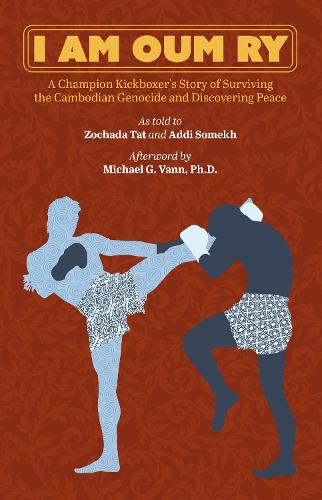
I Am Oum Ry: A Champion Kickboxer's Story of Surviving the Cambodian Genocide and Discovering Peace
(Hardback)
Available Formats
Publishing Details
I Am Oum Ry: A Champion Kickboxer's Story of Surviving the Cambodian Genocide and Discovering Peace
By (Author) Oum Ry
By (author) Zochada Tat
By (author) Addi Somekh
Introduction by Michael G. Vann
DoppelHouse Press
DoppelHouse Press
4th April 2023
United States
Classifications
General
Non Fiction
Martial arts
Genocide and ethnic cleansing
796.817092
Physical Properties
Hardback
176
Width 127mm, Height 190mm
Description
The story of the legendary martial arts fighter and kickboxer Oum Ry is by turns pulse-pounding, disturbing, and powerful. His is an astonishing life told beautifully by his daughter Zochada Tat and Addi Somekh. The book will grip you from its first pages and not let you go."
Jeff Chang, author ofWater Mirror Echo: Bruce Lee and the Making of Asian AmericaandCant Stop Wont Stop: A History of the Hip-Hop Generation
Oum Ry (b.1944)is a former international champion kickboxer who first brought the Cambodian martial art Pradal Serey to the United States. When his family of silver engravers couldn't afford his food or schooling, he lived with monks until seeking outPradal Sereymasters, soon becoming national champion at 23 years old and one of the most famous fighters in the region. For 15 years, he toured Southeast Asia, and without ever suffering a knock-out, won more than 250 fights.After a young mans dream-life of stardom, parties, and girls, his new wife gave birth to a child in 1975, two months before the Khmer Rouge entered Phnom Penh and threw the country into the chaos of civil war, where starvation, disease, and mass executions were common.
Oum Ry survived the genocide though much of his family perished. He was saved many times from death in Cambodia due to fame, talent, and his resilience, but suffered a life-threatening attack during Southern Californias epic gang violence of the 1990s. Earlier, as a refugee with his young family in Chicago, Oum Ry learned English while working cleaning hotels. But within a few years, he had an investor in Long Beach, California and opened one of the first kickboxing gyms in the United States.
This is Oum Ry's life story, which is propelled by his highly anticipated return to Cambodia in February 2022 to reunite with family and to pass on Pradal Serey traditions to the next generation.
Reviews
This memoir strikes hard on multiple levels. It is a reflection of contemporary America and the transnational, transcultural, immigrant experience that many Americans live, whether themselves or vicariously. Oum Ry, like many other fortunate refugees makes his way to the United States where he finds both happiness and deep disappointment. The life of a migrant is bittersweet, filled with hope and longing. Oum Rys life has been a rollercoaster in and out of the fighters ring, dramatic in positive and negative ways. His is a life worth the reading.
Dr. JoAnn LoSavio,Washington State University, Vancouver
Author Bio
Oum Rywas born in 1944 on a Central Cambodian island in the Mekong River to a family of silver engravers. Most of his family was killed in the Cambodian genocide but he miraculously survived, in part because of his fame as a kickboxing champion. His immigration to the United States in 1980 was sponsored by an American pastor and in 1987, he founded Long Beach Kickboxing in California, one of the oldest kickboxing gyms in the United States. His gym has been open six days a week for the last 33 years, training several kickboxing champions and keeping countless kids out of gangs.
Zochada Tat is Oum Rys daughter, an author, and a kickboxing instructor. She took her first steps in the ring at Long Beach Kickboxing and has trained with him throughout her life. She traveled with him to Cambodia in February 2022 and helped translate his oral history.
Addi Somekh is an author and an instructor of critical thinking at University of California Santa Cruz.
Michael G. Vann is a professor of history at California State University, Sacramento, who specializes in Southeast Asia during the era of colonialism and the Cold War. He is the author of The Great Hanoi Rat Hunt: Empire, Disease, and Modernity and his work can be found in Jacobin and The Diplomat.
